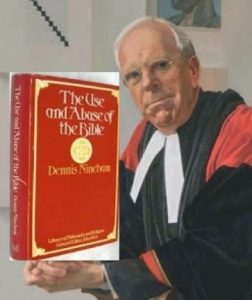
There are many useful and interesting insights into the way the Bible has come to be (mis)used by scholars and laity alike in Dennis Nineham’s The Use and Abuse of the Bible (1976).
One cameo that attracted my attention (over half way through the book) was what Nineham had to say about the New Testament evidence for Christian origins. Being consistent with his opening arguments Nineham acknowledges that we know nothing of the “history” behind the mythical narrative of the “Christ event” in the Gospels. All we know “historically” is that, whatever the historical or biographical reality of Jesus was, it must have been remarkable enough to spawn new communities imbued with a whole new sense of the divine.
The bottom line of the argument is this:
- Christians appeared on the historical landscape.
- And we “know” from the Gospels that the first Christians were transformed from fear and weakness to a people of courage and dynamism as a result of what they proclaimed to be the resurrection.
- Therefore, God had done “something” (we don’t know what, exactly) most remarkable in the life of Jesus Christ in order to have caused this emergence of Christian communities.
One might think that the hypothesis is thus declared true because faith in God and the Bible permits no other hypothesis. (Nineham writes as a Christian and makes clear that his belief in God is bound up in his belief in “the Christ event”.) That’s not how Nineham explains it, however.
Non-Christian scholars of earliest Christianity today sometimes echo a mundane (cynical?) version of this argument: There can be no better explanation for the origins of Christianity than a failed life of yet another common healer/exorcist, preacher of platitudes and false prophet. (This latter explanation probably requires a greater miracle to make it work than the Christian explanation.)
True, Nineham does make passing mention of “extremists” who have proposed alternative hypotheses, but he dismisses these as quickly as he mentions them because the conventional wisdom does not accept their views. Ironically, in the first chapter of his book, “Cultural Change and Cultural Relativism”, he explains clearly why unconventional hypotheses, in particular those that affect the way we view the Bible, have such a hard time being taken seriously.
Before addressing the details of Nineham’s argument relating to Christian origins I’ll highlight some of his main insights into the ways the Bible has come to be misread and misused, and why, up to his own day.
Traditional use of the Bible
We know the Bible has for centuries been regarded as a sacred book, invested with infallible authority, wrapped in a mysterious quality and virtual sanctity. Its formal title accordingly Holy Bible.
What does this mean, exactly? These are the particular beliefs that have long accompanied readers of the Bible since late antiquity: Continue reading “Use and Abuse of the Bible – Part 1”
